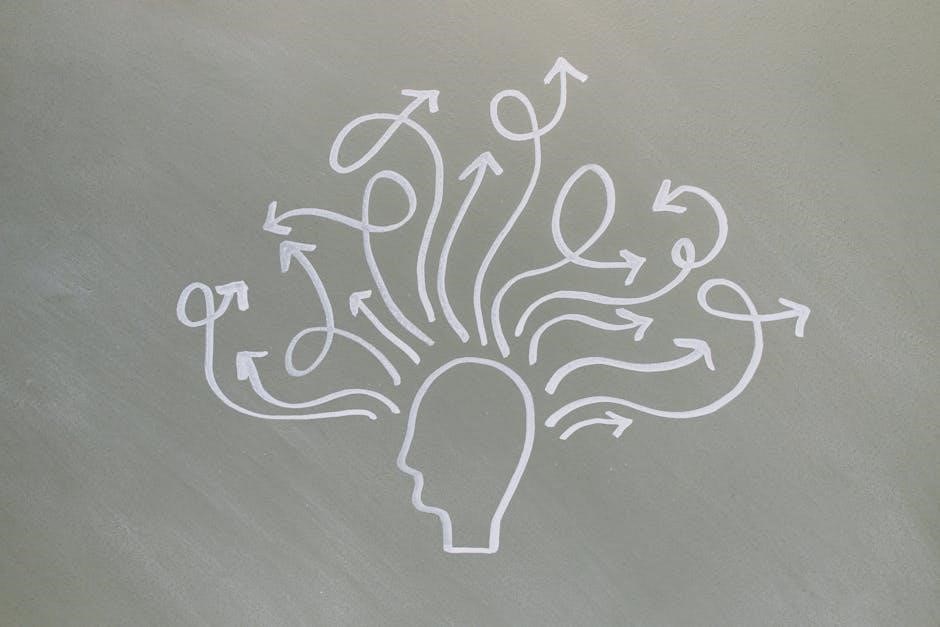
-
By:
- cierra
- No comment
developmental psychology pdf
Developmental psychology studies human growth and development across the lifespan, examining physical, cognitive, and social changes from birth to old age.
1.1 Definition and Scope
Developmental psychology is the scientific study of human development, focusing on psychological processes and behavioral changes across the lifespan. It explores biological, cognitive, language, social, and emotional growth, examining how individuals develop from birth to old age. This field investigates the factors influencing growth, including genetic, environmental, and cultural elements. By understanding these processes, developmental psychology provides insights into human behavior and development, offering a comprehensive framework for addressing lifespan changes.
1.2 Importance of Studying Developmental Psychology
Studying developmental psychology is crucial for understanding human growth and behavior across the lifespan. It provides insights into cognitive, emotional, and social development, enabling professionals to address challenges like learning disabilities and mental health issues. This knowledge aids in designing effective educational programs, policies, and interventions, ultimately improving quality of life. By understanding developmental processes, society can better support individuals at all stages, fostering healthy development and addressing special needs effectively.
Theoretical Approaches in Developmental Psychology
Developmental psychology employs various theories to explain human growth, including psychoanalytic, cognitive-developmental, and social learning approaches, each offering unique insights into behavior and development across the lifespan.
2.1 Psychoanalytic Theory
Psychoanalytic theory, founded by Sigmund Freud, emphasizes unconscious thoughts and childhood experiences in shaping behavior. It proposes the structure of personality as id, ego, and superego. Defense mechanisms, like repression, help manage conflicts. Stages of psychosexual development, such as oral and genital, define growth. Critics argue the theory lacks empirical support but remains influential in understanding emotional and behavioral development. Its focus on internal drives and early life experiences continues to impact developmental psychology research and practice.
2.2 Cognitive-Developmental Theory
Cognitive-developmental theory, notably advanced by Jean Piaget, focuses on how individuals construct and organize knowledge through active interaction with their environment. It emphasizes stages of cognitive growth, such as sensorimotor, preoperational, concrete operational, and formal operational, each representing a unique way of thinking. The theory highlights adaptation processes like assimilation and accommodation, enabling learning and problem-solving. While criticized for rigid stage boundaries, it remains influential in understanding intellectual and conceptual development across the lifespan, particularly in educational contexts.
2.3 Social Learning Theory
Social learning theory, developed by Albert Bandura, posits that individuals acquire behaviors, knowledge, and attitudes by observing and imitating others. It emphasizes the role of observation, imitation, and modeling in learning. Bandura’s famous Bobo doll experiment demonstrated how aggressive behaviors could be learned through observation. The theory also highlights the importance of reinforcement and motivation in sustaining learned behaviors. It bridges cognitive and behavioral perspectives, offering practical applications in education, behavior modification, and understanding cultural influences on development.

Physical Development Across the Lifespan
Physical development involves growth, maturation, and biological changes across the lifespan, from infancy through adulthood and aging, influencing motor skills, strength, and overall health.
3.1 Stages of Physical Growth
Physical growth progresses through distinct stages: infancy, childhood, adolescence, adulthood, and old age. Each stage is marked by significant changes in height, weight, and motor abilities. Infancy sees rapid development, while adolescence brings puberty-related changes. Adulthood maintains stability, and aging leads to physical decline. These stages are influenced by genetics, nutrition, and environmental factors, shaping overall health and physical capabilities across the lifespan.

Cognitive Development and Language Acquisition
Cognitive development examines the evolution of thinking, problem-solving, and memory from infancy through adulthood. Language acquisition explores how individuals develop communication skills, forming the basis of human interaction.
4.1 Key Milestones in Cognitive Development
Cognitive development progresses through distinct stages, from infancy to adulthood. Infants develop object permanence, understanding that objects exist even when unseen. In childhood, egocentrism fades, enabling perspective-taking. Adolescents develop abstract thinking and problem-solving skills. These milestones are shaped by biological maturation and environmental interactions, forming the foundation for learning, memory, and intellectual growth throughout life.
Social and Emotional Development
Social and emotional development involves acquiring skills to manage emotions, build relationships, and understand social norms, essential for lifelong interpersonal and psychological well-being.
5.1 Factors Influencing Social-Emotional Growth
Social-emotional growth is shaped by family environments, peer relationships, and cultural norms. Biological factors like temperament and neurobiological development also play a role. Parenting styles, such as responsiveness and consistency, significantly influence emotional regulation and social skills. Additionally, socioeconomic status and access to educational resources impact opportunities for social-emotional development. Cultural background further molds values and interpersonal behaviors, while educational settings provide structured environments for skill refinement. These factors interact dynamically, contributing to individual differences in social-emotional outcomes across the lifespan.

Role of Educational Settings in Development
Educational settings provide structured environments for cognitive, social, and emotional growth, offering practical experiences that enhance developmental processes across the lifespan.
6.1 Impact of Early Childhood Education
Early childhood education plays a crucial role in fostering cognitive, social, and emotional development. Structured programs provide enriching environments that promote learning and exploration. These settings enable children to develop essential skills, such as problem-solving and communication, while fostering creativity and curiosity. Research shows that high-quality early education contributes to better academic outcomes and social adaptability later in life. Practical experiences, like observing and participating in nursery settings, offer hands-on understanding of developmental processes. This foundational period lays the groundwork for lifelong learning and personal growth.
Understanding Atypical Development
Atypical development involves studying unusual patterns of growth, such as developmental delays or disorders, focusing on special populations and their unique challenges.
7.1 Psychological Development in Special Populations
Psychological development in special populations, such as those with developmental delays or disorders, is a key focus of atypical development studies. Research highlights challenges faced by very low birth weight (VLBW) and extremely low birth weight (ELBW) children, with approximately 25% experiencing severe or multiple developmental difficulties. Factors influencing their growth include biological risks and environmental interactions. Understanding these dynamics helps tailor interventions to improve quality of life and developmental outcomes for these individuals;

Cultural Influences on Development
Cultural influences shape human development by affecting behaviors, values, and social interactions. Cross-cultural perspectives highlight variations in developmental patterns across different societies and traditions globally.
8.1 Cross-Cultural Perspectives on Human Development
Cross-cultural perspectives reveal how societal norms, values, and practices influence human development. Cultural differences shape social, cognitive, and emotional growth, highlighting variations in developmental milestones worldwide. Understanding these variations enhances the applicability of developmental theories across diverse populations, emphasizing the role of culture in shaping behavior and cognition. Such insights are crucial for developing culturally sensitive interventions and policies that address the unique needs of individuals from varied backgrounds. This approach fosters a broader understanding of human development beyond Western-centric models, promoting inclusivity in psychological research and practice.

Modern Research Trends in Developmental Psychology
Modern research in developmental psychology employs advanced methodologies like neuroimaging and longitudinal studies to explore cognitive, social, and emotional growth across diverse populations and cultures.
9.1 Advances in Research Methods
Recent advances in research methods have enhanced the study of developmental psychology. Techniques like longitudinal studies, neuroimaging, and cross-cultural comparisons provide deeper insights into cognitive, social, and emotional development. These methods allow researchers to track changes over time, understand brain development, and explore cultural influences. Additionally, interdisciplinary approaches combining psychology with neuroscience and sociology offer a more holistic understanding. Such innovations enable researchers to develop more accurate theories and interventions, addressing diverse populations and real-world challenges effectively.

Applications of Developmental Psychology in Real-World Settings
Developmental psychology informs education, healthcare, and policy, improving programs for children and adults by addressing developmental needs and promoting optimal growth across life stages.
10.1 Practical Implications for Education and Policy
Developmental psychology provides insights for designing effective educational programs, informing curriculum development, and improving teaching methods. It also shapes policies addressing childhood development, education access, and social support systems. By understanding developmental stages, educators can tailor interventions to meet students’ needs, enhancing learning outcomes. Similarly, policymakers can create evidence-based programs promoting healthy development and addressing disparities. These applications ensure that developmental principles are integrated into real-world solutions, fostering optimal growth and societal well-being across the lifespan.